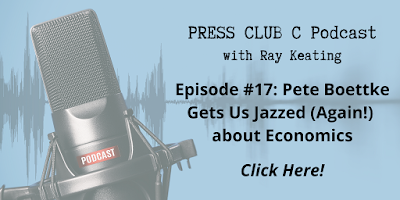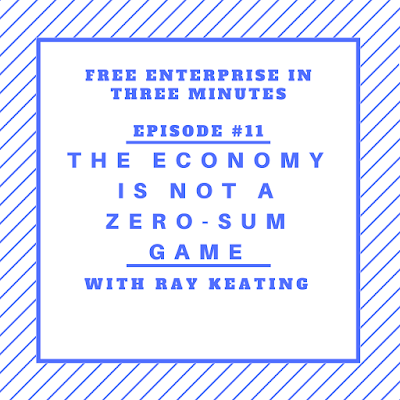by Ray Keating
The Keating Files – June 29, 2020
During my time writing, speaking, teaching, and doing policy work over the years, I’ve run into a lot of misguided economics. Indeed, I often find myself wondering if this or that person ever took an economics class. I tend to ask this most when testifying before Congress.
But then I realize that these people probably did take at least one economics course in college. The problem was who taught the course, not to mention the textbook being used. They simply learned bad economics.
For the sake of our nation and others around the world, we economists need to get a heck of a lot better at what we do, including getting focused on what we’re actually supposed to do. Fortunately, some excellent economists do spend their careers working to get the discipline properly focused, and to improve economic education.
That includes Dr. Peter Boettke, who is a professor of economics and philosophy at George Mason University, and the director of the F.A. Hayek Program for Advanced Study in Philosophy, Politics, and Economics at the Mercatus Center, among other responsibilities.
Boettke has a new book out titled The Four Pillars of Economic Understanding (American Institute for Economic Research, 2020). This book serves multiple purposes. It’s a wonderful introduction to economics. It serves as a refresher on economic thinking. It is a much-needed corrective for economics, and economists, gone awry. It also will re-energize many economists and other students of the discipline in terms of why economics matters. It certainly re-energized me on this front. And all of that in a highly readable 172 pages.
Let’s briefly highlight 10 key points Boettke makes, in the hopes that this will ignite interest in the reader to absorb the entire book.
First, Boettke highlights several times the roles that prices, profits, losses and property rights play in the market. In his introductory chapter, for example, he writes, “Prices guide us, profits lure us, and losses discipline us in our decisions, and property rights provide the institutional infrastructure required for all of this to take place.” And later, he adds that “a market is never perfect, nor is it in equilibrium. The price system guides individuals to discover mutual gains from trade, prodding them to find the most valuable uses for scarce resources and thus moving the whole system into more efficient resource allocation.”
Second, Boettke hits the mark on what the purpose, if you will, of economics is, and why it matters. He observes, “[Adam] Smith’s analysis of the wealth of nations is not ultimately measured in trinkets and gluttonous acts of consumption, but by a rising standard of living that is shared by more and more of the general population. It is an empirical matter as to which set of institutions best achieve that task. But the concern with raising the living standards of the least advantaged in society is never far from view in any careful reading of liberal political economy from Adam Smith to Vernon Smith.” Boettke’s use of the term “liberal,” by the way, refers to classical liberalism, not the modern-day, Progressive liberalism.
Third, that’s right, economists, including free market economists, do not teach, to quote Gordon Gekko, that “greed is good.” Indeed, it’s not about selfishness. Adam Smith often is misinterpreted on this point. Boettke offers a short, but important summary of his own thinking: “In my view there have been two great defining characteristics of economics since its birth as a discipline in the eighteenth century: the market economy’s self-regulating capacity (the invisible hand) and self-interest (rational choice).” Note how he identifies “self-interest” – not as selfishness, but as rational choice.
Fourth, Boettke also makes clear that both competition and cooperation work to improve life in the market system. He states that “we require institutions that will enable us to engage in productive specialization, realize mutual gains from exchange, and achieve peaceful social cooperation among distant and disparate people.” Pointing to Paul Rubin’s book The Capitalist Paradox, Boettke further explains, “Rubin’s book is highly recommended because he offers a useful corrective by stressing the importance of social cooperation among distant and disparate people, rather than the ruthless competitive nature of market society. Yes, market competition is unrelenting and valuable. But the by-product isn’t just the delivery of goods and services at least cost, but also the network of social relationships and bonds of cooperation that are formed even among strangers.”
Fifth, Boettke also notes that classical liberal economics understands the need for institutions to “produce a society of free and responsible individuals, who have the opportunity to participate and prosper in a market economy based on profit and loss, and who live in, and are actively engaged in, caring communities,” while also requiring “a set of institutions where bad men could do least harm if they were to assume positions of power.”
Sixth, thankfully The Four Pillars of Understanding does not neglect the central player in the market, in the process of economic growth, i.e., the entrepreneur. The great and glaring failure of economics driven by pristine mathematical models meant to predict where the economy might be headed is that those economists and their models have no way to account for the entrepreneur. That, of course, makes you wonder about the usefulness of such work.
Boettke points out, “Economic progress is ... a consequence of entrepreneurial innovation.” He explains, “Entrepreneurs in the private sector act on price signals to constantly seek out deals by buying low and selling high, and in doing so bring mutual gains from trade. But these entrepreneurs are also constantly on the lookout for cost saving technologies in production and improvements in the delivery mechanism to consumers of their goods and services. And, don’t ever forget, the innovations they introduce and the discovery of new products and new services that better satisfy the demands of consumers. Hope in the form of improved living conditions is born out of individuals being able to bet on ideas and bring those bets to life.”
While Boettke advises “don’t ever forget,” so many in the economics profession have forgotten to the detriment of economic education and policy.
Seventh, so, let’s turn directly to economic education. Boettke does yeoman’s work in laying out what are the essential economic principles – the economic way of thinking – that should be the focus of teaching economics. Yet, that has not been done by many teachers for a variety of reasons, including, as he notes, a transformation of the discipline from teaching economic principles to taking on the task of assisting the government with interventionist policies.
I’ve long argued that when various economists got bored with economics, they decided to dress up their political preferences in the guise of economics. See John Maynard Keynes and his disciples. Indeed, far too many within the economics discipline were more than happy to sign on, and then teach their students accordingly. Hence, we have the problem persisting today of people learning bad economics in too many classrooms. Boettke counters this impulse, including by pointing out, “Economics is a tool for social understanding, and not a tool for social control.”
Eighth, Boettke makes clear the link between the corruption of economics in the classroom and misguided public policies. He points to the work of MIT economist Paul Samuelson, who was prominent in leading the charge to ignore the common knowledge established by classical political economy. Boettke notes the impact of Samuelson and his long-dominant textbook on thinking about how the market worked, or in Samuelson’s case, didn’t work, in the public arena: “Samuelson knew that if he could wrest control of the tacit presuppositions of public policy functionaries, then their thoughts and actions would be guided by what he taught about market failure, macroeconomic instability, and government as a corrective to our economic woes. It’s an amazing achievement what he did. For at least a generation, perhaps two, he controlled both the introduction to economics market, and the advanced training of PhD students in the economics market.”
Ninth, Boettke makes clear what the mission of the economist should be: “Those of us who ... believe in the common-sense nature of economic reasoning must be willing to engage in the futile crusade for economic literacy in the general population, to continually refine our understanding of basic economics, and to persuade our peers in the discipline that there isn’t anything boring about working with the persistent and consistent application of economic principles to understanding the way the world works in all its given diversity. Simple economics is not simpleminded, and clarity of exposition of the principles of economics is to be valued over quickness of mind and cleverness in presentation.” Well said.

Tenth, Boettke addresses the arrival of incoherent populism in the current economic policy debate. Boettke acknowledges that classical liberalism and populism often wind up criticizing the same ills brought about by Progressivism’s interference in society and the market. But he highlights two big differences. First, the classical liberal “critique of the progressive elite is grounded in sound economics and the grand and honorable tradition of political economy, and is not born in disillusionment and angry frustration,” as is the case with populism. For good measure, there is the great irony of populism. Boettke explains that “the populist criticizes the establishment elite in public policy while advocating an increased role of government and its agencies to counter the social ills of instability, inefficiency and inequality.” Populists don’t like government action, unless it’s on their behalf.
I was fortunate to have two excellent professors during my formal economics education (I’ve learned and continue to learn from so many outside the classroom) – one at the beginning and the other at the end. During my undergraduate days, Dr. John Arnez got me interested in economics by explaining it in sound, common-sense fashion, and making clear how economics is concerned about expanding opportunity and improving living standards for all. Pete Boettke came in at the end of my graduate school education, and he reinforced and expanded my thinking as an economist. Others can benefit from learning sound economics from Dr. Boettke through his various books, including his notable accomplishment with The Four Pillars of Economic Understanding.
__________
See related...
See recent...
__________
















